
Agricultural and farm machinery company Titan (NSYE:TWI) missed Wall Street’s revenue expectations in Q3 CY2024, but sales rose 11.5% year on year to $448 million. Next quarter’s revenue guidance of $400 million underwhelmed, coming in 13.1% below analysts’ estimates. Its GAAP loss of $0.25 per share was also 2,600% below analysts’ consensus estimates.
Is now the time to buy Titan International? Find out by accessing our full research report, it’s free.
Titan International (TWI) Q3 CY2024 Highlights:
- Revenue: $448 million vs analyst estimates of $471.6 million (5% miss)
- EPS: -$0.25 vs analyst estimates of $0.01 (-$0.26 miss)
- EBITDA: $20.5 million vs analyst estimates of $28.62 million (28.4% miss)
- Revenue Guidance for Q4 CY2024 is $400 million at the midpoint, below analyst estimates of $460.1 million
- Gross Margin (GAAP): 13.1%, down from 15.9% in the same quarter last year
- Operating Margin: 0.6%, down from 6.7% in the same quarter last year
- EBITDA Margin: 4.6%, down from 6.8% in the same quarter last year
- Free Cash Flow Margin: 13.4%, up from 9.3% in the same quarter last year
- Market Capitalization: $466.4 million
Paul Reitz, President and Chief Executive Officer stated, "I have been spending a lot of time with customers in recent months, and it is clear that Titan's position as a valued partner centers on the innovative nature of the products we have developed and continue to develop. The Low-Side Wall ("LSW") wheel/tire assemblies continue to capture attention in the marketplace and I recently heard that directly from some very large farmers."
Company Overview
Acquiring Goodyear’s farm tire business in 2005, Titan (NSYE:TWI) is a manufacturer and supplier of wheels, tires, and undercarriages used in off-highway vehicles such as construction vehicles.
Agricultural Machinery
Agricultural machinery companies are investing to develop and produce more precise machinery, automated systems, and connected equipment that collects analyzable data to help farmers and other customers improve yields and increase efficiency. On the other hand, agriculture is seasonal and natural disasters or bad weather can impact the entire industry. Additionally, macroeconomic factors such as commodity prices or changes in interest rates–which dictate the willingness of these companies or their customers to invest–can impact demand for agricultural machinery.
Sales Growth
Reviewing a company’s long-term performance can reveal insights into its business quality. Any business can have short-term success, but a top-tier one sustains growth for years. Over the last five years, Titan International grew its sales at a sluggish 4.2% compounded annual growth rate. This shows it failed to expand in any major way, a rough starting point for our analysis.
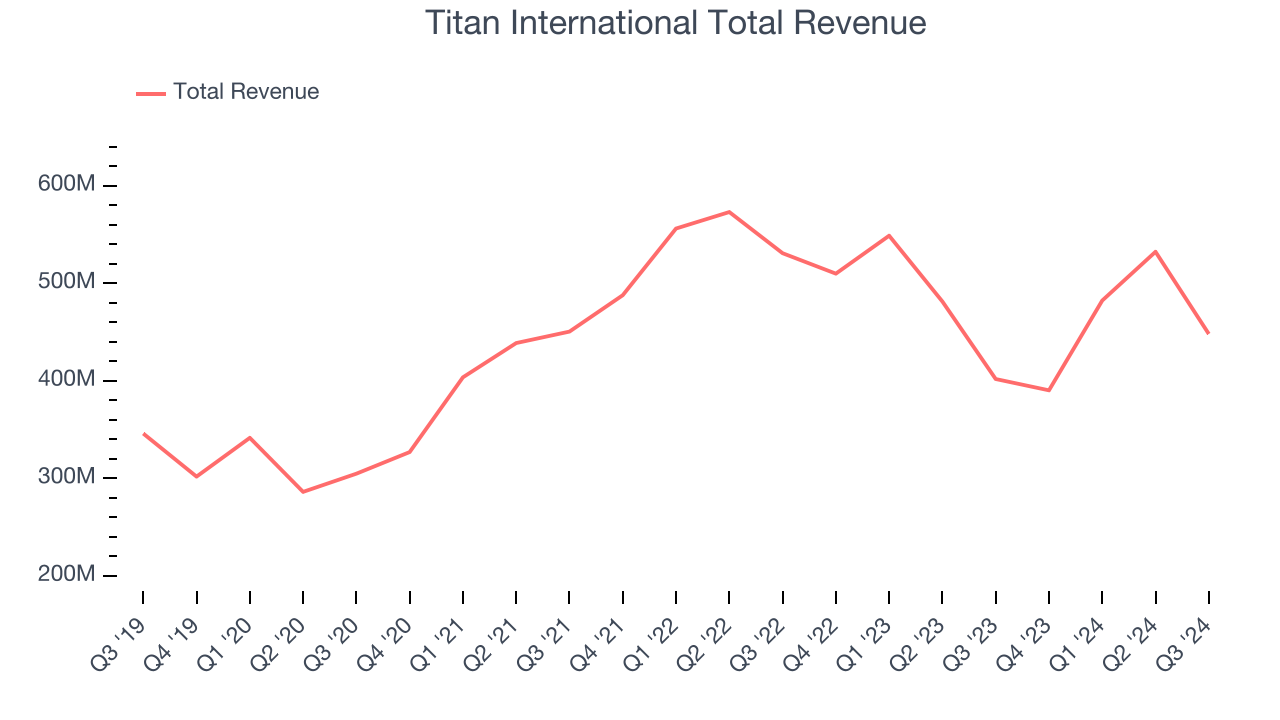
We at StockStory place the most emphasis on long-term growth, but within industrials, a half-decade historical view may miss cycles, industry trends, or a company capitalizing on catalysts such as a new contract win or a successful product line. Titan International’s history shows it grew in the past but relinquished its gains over the last two years, as its revenue fell by 7.1% annually. 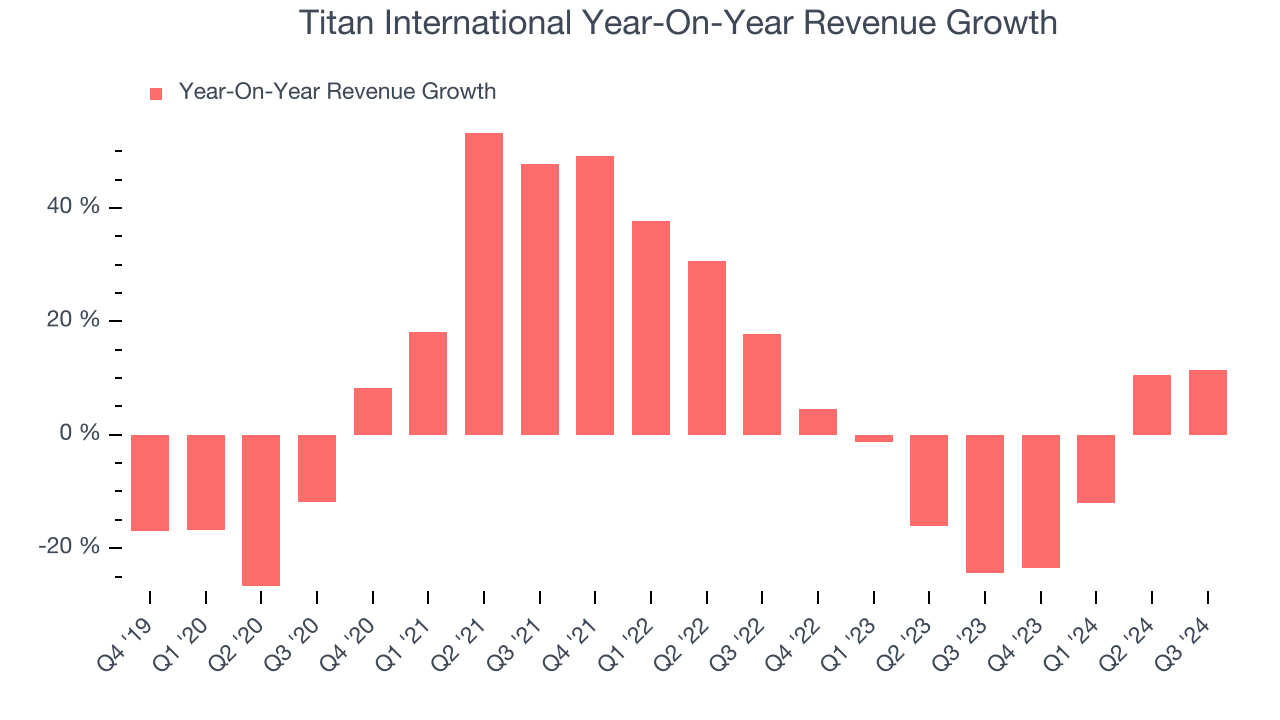
This quarter, Titan International’s revenue grew 11.5% year on year to $448 million, falling short of Wall Street’s estimates. Management is currently guiding for a 2.5% year-on-year increase next quarter.
Looking further ahead, sell-side analysts expect revenue to grow 6.1% over the next 12 months, an improvement versus the last two years. While this projection shows the market thinks its newer products and services will spur better performance, it is still below average for the sector.
Unless you’ve been living under a rock, it should be obvious by now that generative AI is going to have a huge impact on how large corporations do business. While Nvidia and AMD are trading close to all-time highs, we prefer a lesser-known (but still profitable) semiconductor stock benefitting from the rise of AI. Click here to access our free report on our favorite semiconductor growth story.
Operating Margin
Operating margin is an important measure of profitability as it shows the portion of revenue left after accounting for all core expenses–everything from the cost of goods sold to advertising and wages. It’s also useful for comparing profitability across companies with different levels of debt and tax rates because it excludes interest and taxes.
Titan International was profitable over the last five years but held back by its large cost base. Its average operating margin of 5.3% was weak for an industrials business. This result isn’t too surprising given its low gross margin as a starting point.
On the plus side, Titan International’s annual operating margin rose by 7 percentage points over the last five years.
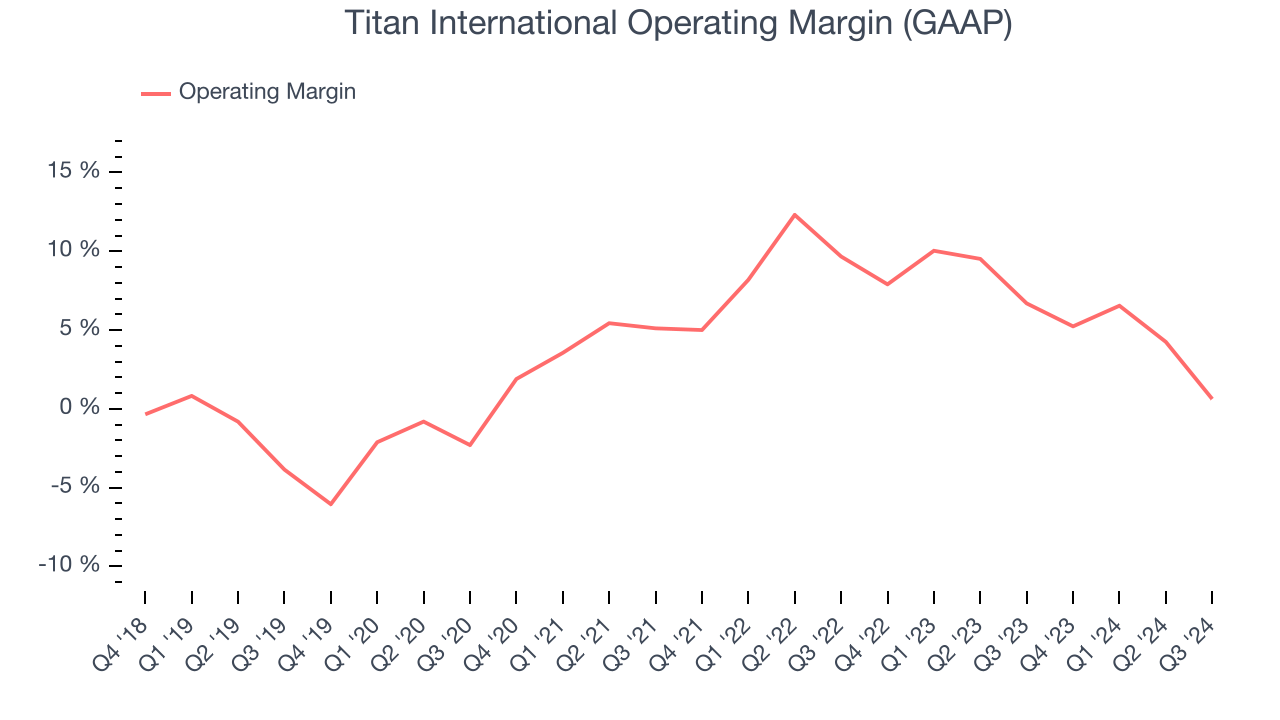
In Q3, Titan International’s breakeven margin was down 6.1 percentage points year on year. Since Titan International’s operating margin decreased more than its gross margin, we can assume it was recently less efficient because expenses such as marketing, R&D, and administrative overhead increased.
Earnings Per Share
We track the long-term change in earnings per share (EPS) for the same reason as long-term revenue growth. Compared to revenue, however, EPS highlights whether a company’s growth was profitable.
Although Titan International’s full-year earnings are still negative, it reduced its losses and improved its EPS by 28% annually over the last five years. The next few quarters will be critical for assessing its long-term profitability.
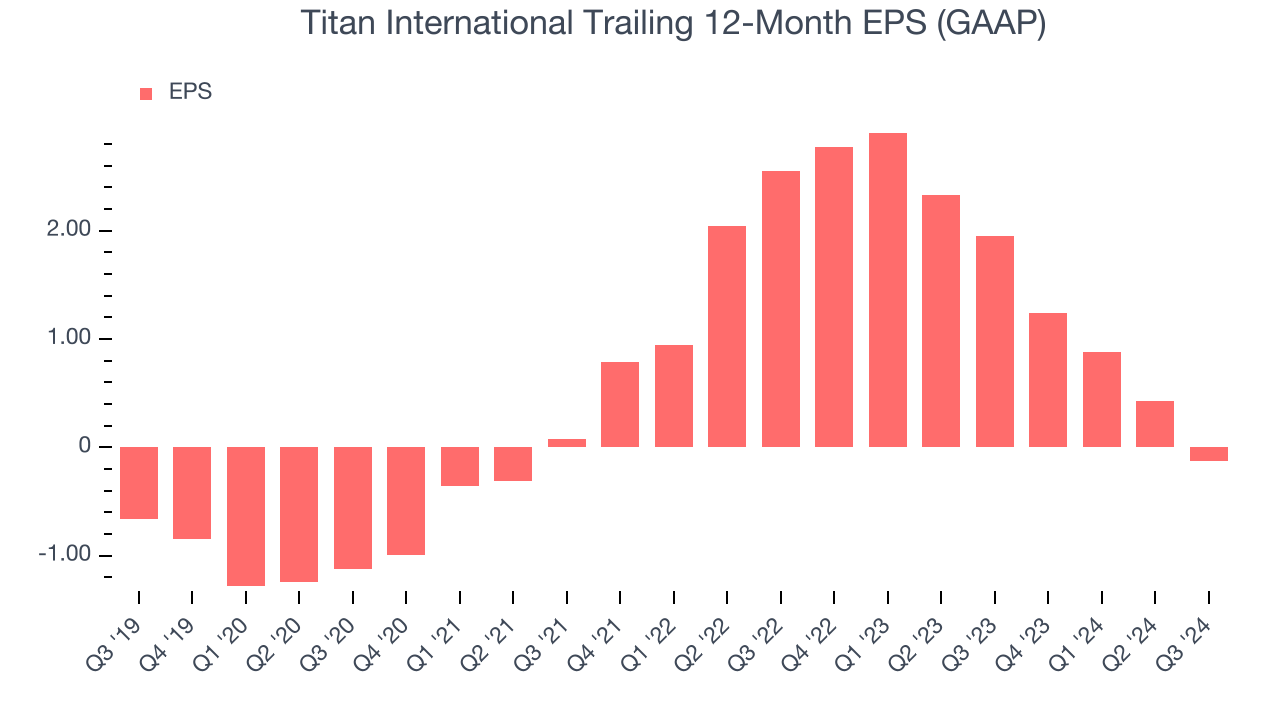
Like with revenue, we analyze EPS over a shorter period to see if we are missing a change in the business.
Sadly for Titan International, its EPS declined by more than its revenue over the last two years, dropping 43.2%. This tells us the company struggled because its fixed cost base made it difficult to adjust to shrinking demand.
Diving into the nuances of Titan International’s earnings can give us a better understanding of its performance. Titan International’s operating margin has declined by 9 percentage points over the last two yearswhile its share count has grown 15.1%. This means the company not only became less efficient with its operating expenses but also diluted its shareholders. 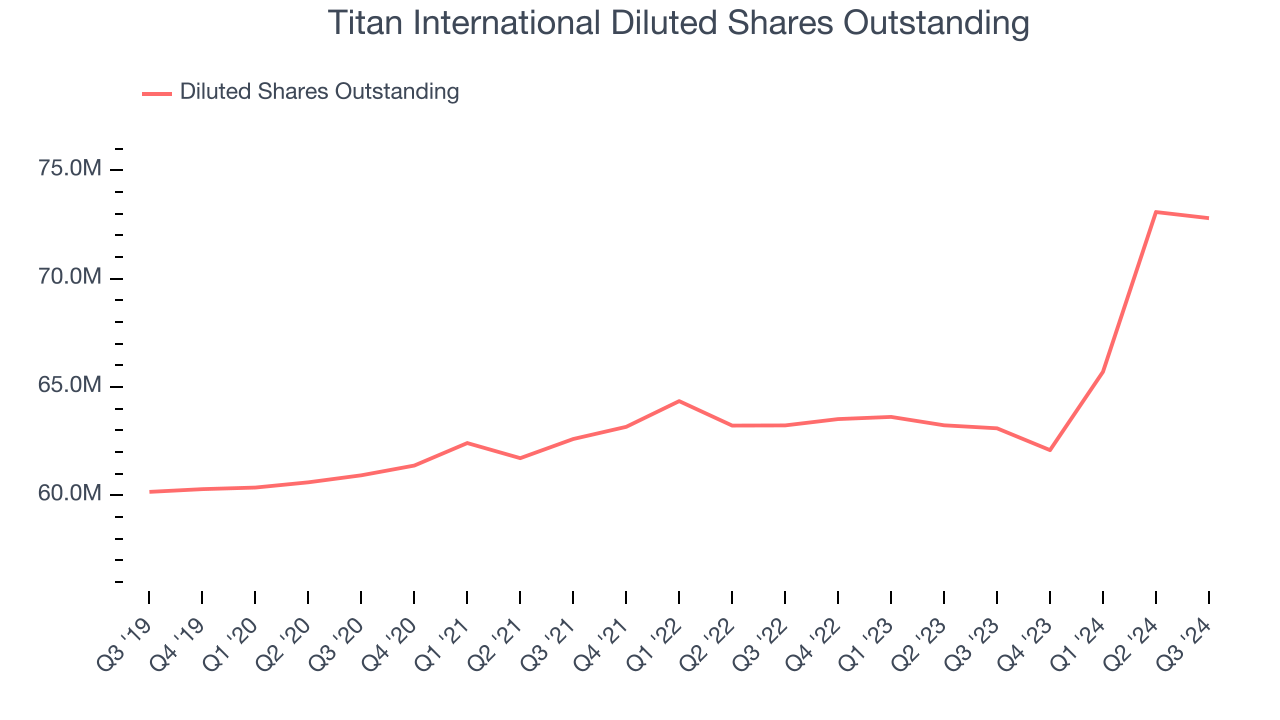
In Q3, Titan International reported EPS at negative $0.25, down from $0.31 in the same quarter last year. This print missed analysts’ estimates. Over the next 12 months, Wall Street is optimistic. Analysts forecast Titan International’s full-year EPS of negative $0.13 will reach break even.
Key Takeaways from Titan International’s Q3 Results
We struggled to find many strong positives in these results as its revenue, EPS, and EBITDA missed analysts' expectations. Its full-year revenue guidance also fell short of Wall Street’s estimates. Overall, this quarter could have been better. The stock traded down 7.7% to $6.80 immediately after reporting.
Titan International underperformed this quarter, but does that create an opportunity to invest right now? We think that the latest quarter is only one piece of the longer-term business quality puzzle. Quality, when combined with valuation, can help determine if the stock is a buy. We cover that in our actionable full research report which you can read here, it’s free.





